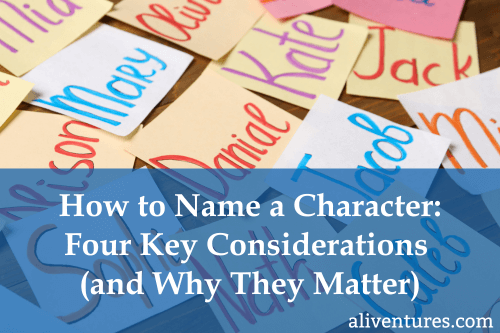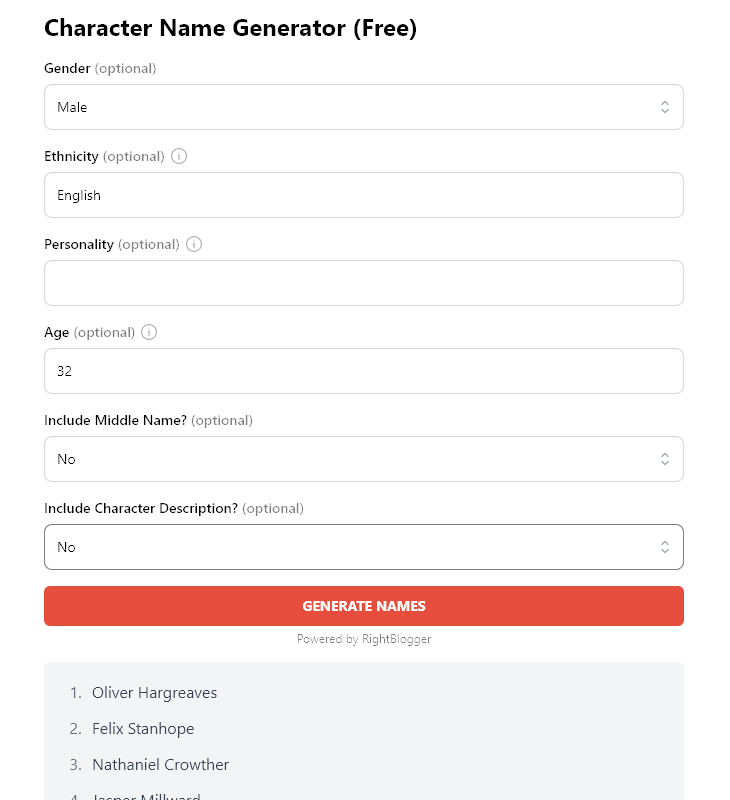How to Name a Character: Four Key Considerations (and Why They Matter)

Choosing names for your characters can feel almost as tricky as naming a baby … you want to get it right!
Your character’s name needs to reflect not just their age, nationality, and upbringing – it also needs to fit the sort of person who they are.
A “Jane” is likely to be a very different sort of character from a “Juniper”, for instance; and a “Tom” is probably not going to have the same personality as a “Thistle”.
Sometimes, character names might just come to you: of course your protagonist is an “Emily” and of course her best friend is “Natalie”. Alternatively, you might have an idea of the kind of name you want: short and strong, long and elegant, unusual, etc.
But in many cases, you might not have much idea at all. It’s no wonder that some writers get stuck at the planning stage, trying to figure out what to call everyone in their novel.
We’re going to run through some key considerations for naming your characters – and why these matter.
#1: Your Character’s Name Shouldn’t Have Unwanted Associations
We all probably have names we wouldn’t use because they’re so strongly associated with someone in our life – whether that’s a dearly loved relative or a school bully.
But many names also have associations for the world in general. It’s probably obvious that giving your character the surname “Hitler” will be a massive distraction for readers, for instance.
You’ll probably want to steer clear of names of celebrities, sports stars, or politicians – particularly surnames, but really unusual first names are best avoided too.
Think about fictional characters, too – especially if they’re in the same genre, or have particularly unusual names (or unusual spellings/variations). “Harry” is fine to use, but “Hermione” is going to have most people thinking instantly of Harry Potter. “Edward” is fine, but “Eddard” will definitely make readers think of the character from Game of Thrones.
Watch out for names, too, that may make your audience giggle. For instance, “Randy” is a perfectly good name in the USA, but in the UK, it’s a word that means “horny”.
Why it Matters
Anything that distracts your reader from your story matters! Also, if you use the name of a famous real-world or fictional person, they’ll wonder why, and whether any connotations are plot-relevant. Good character names don’t distract from the story.
#2: Your Character’s Name Should Be Appropriate for Their Age
If your main character is in her 20s, she’s probably not going to be called Irene or Dorothy.
If your main character is in her 70s, she’s probably not going to be called Luna or Chloe.
Of course, your character might be called something unexpected for a good reason: perhaps your 22-year-old Dorothy was named after a beloved great aunt (or maybe her parents were big fans of The Wizard of Oz). But unless there’s an actual reason behind an unusual name, stick with names that the reader will associate with your character’s age.
A good source of these is to look up a list of baby name lists from a specific decade, so you can see what types of names were popular when your character was born – or use a character name generator that lets you enter the character’s age.
Why it Matters
If the 6 year old in your contemporary novel is called “Howard”, it’s going to sound unexpected for the time period, at the very least! Readers may struggle to really believe in the character, without some explanation of why he has a name that we’d expect his great-Grandfather to have. Similarly, if you’re writing a historical novel set in the 1920s, a character called “Chelsea” or “Mercedes” will seem anachronistic.
#3: Your Character’s Name Should Fit Their Nationality
Your character’s name needs to make sense for their nationality. If they’re Spanish, they’re unlikely to be called “John Smith”.
This is one area where some character name generators fall down a bit: they’ll mash up first names and surnames without any regard for the nationality.
Ideally, use a character name generator where you can set the nationality – that way, you can come up with names that work for your character. Another good option is to look up common names from the character’s home country.
Important: Remember, not all cultures follow Western naming conventions of “Firstname Surname.” For instance, the family name may come first, as in many Asian cultures.
Why it Matters
If your character is called Juan Smith or Tom Sørensen, their name may strike readers as a bit odd. Unless there’s a reason that their first name is from one culture and their surname from another (e.g. their parents are from different countries), readers may think you just haven’t done your research or have picked names at random.
#4: Your Character’s Name Should Fit Their Personality
Let’s say your protagonist is a 35-year-old British man. Is he a Craig or an Anthony? Both those names probably give you different impressions of what that character’s personality will be – maybe based on people you’ve known with the names. The “wrong” name can seem like an awkward fit for a character.
I think this is where writers can really get stuck: choosing a name that feels like a fit for who your character is can be really tough. You might find you can get a sense of what types of names may work – e.g. perhaps you want a short name vs a long one, or you want a name with a strong sound like “K” or “X” in there.
Using a random name generator can help, but ideally, you want a tool that lets you give some indication of your character’s personality – so that names can be tailored accordingly.
Why it Matters
Possibly this one matters more to writers than to readers! Unless the name feels very “off” for your character (a hooligan called “Arthur”, for instance) then readers will probably be fine with the name. But as the writer, you might feel your character doesn’t fully come alive until you choose a name that fits who your character is at the core.
Other Key Pointers for Character Names
Along with avoiding unwanted associations – and thinking about your character’s age, nationality, and personality – you might want to keep these points in mind too:
Consider What Your Character’s Name Means
Readers are unlikely to know (or care about!) the etymology of your character’s name … but you might like to pick a name that has a special meaning or thematic resonance.
For instance, the names “Felix” and “Felicity” mean happy, luck, or good fortune, and perhaps that has some relevance in your story.
Avoid Having Two Characters With Similar Names
In real life, of course we all know people with the same name. There are a lot of “Claires” and “Daves” among the parents of my kids’ friends, for instance.
In your story, though, it’s going to be unnecessarily confusing for readers if two characters have the same name – and authors know this, so readers will expect you to avoid it. (This is what TV Tropes calls the “One-Steve Limit”.)
It’s also a good idea to avoid similar character names. As a reader, I tend to get confused if characters of the same gender have a name of a similar length, starting with the same letter. (So “Christopher” and “Caroline” are fine, but not “Catherine” and “Caroline”.)
If there’s any confusion from your beta readers, change one character’s name.
Don’t Make Sci-Fi / Fantasy Names Too Weird
I’m not keen on hugely weird-looking, unpronounceable character names – instead, it’s best if your SF/F world has names that are straightforward to read.
You may even want your culture to have a standard naming convention – e.g. in Star Trek, quite a few male Vulcan names start with S, end with K, and have around five letters (Spock, Surak, Sarek, etc).
Decide Whether Your Character Goes by a Shortened Form or Nickname
Many of us have different versions of our name: my full name is “Alison”, but I’m “Ali” to almost everyone (and “Al” to very close family).
Your character “Christopher” might be “Chris” to most people … or just to close friends. Or maybe everyone calls him Chris except for old school friends, who know him by his nickname, Spud.
Keep in mind that your character should only go by one name in the narrative – unless there’s a good reason to switch (e.g. you’ve changed to a different viewpoint character’s perspective).
If you want to quickly come up with a whole list of potential character names, try my Character Name Generator – you can give it your character’s age, ethnicity, and even personality.

Remember … if a name doesn’t quite fit, you can always change it. (“Find and Replace” is a very handy tool for this.) So don’t get stalled for too long picking the perfect name – just grab a name from the generator and run with that. As you get to know your character better, you might find a little tweak to the name that makes it perfect.
About

I’m Ali Luke, and I live in Leeds in the UK with my husband and two children.
Aliventures is where I help you master the art, craft and business of writing.
Start Here
If you're new, welcome! These posts are good ones to start with:
Can You Call Yourself a “Writer” if You’re Not Currently Writing?
The Three Stages of Editing (and Nine Handy Do-it-Yourself Tips)
My Novels

My contemporary fantasy trilogy is available from Amazon. The books follow on from one another, so read Lycopolis first.
You can buy them all from Amazon, or read them FREE in Kindle Unlimited.

This guide is super helpful! I’ve definitely gotten stuck before trying to find the “right” name, and I never thought about how much age and nationality affect believability. I’m going to use these tips when naming characters for my stories.
I’m so glad this was helpful, Shaheen! 🙂